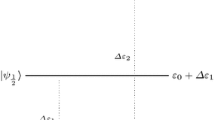Abstract
It is shown that computations can be founded on the laws of the genuine(Birkhoff—nvon Neumann) quantum logic treated as a particular version ofŁukasiewicz infinite-valued logic. A new way of encoding nonexact data whichencodes both the value of a number and its “fuzziness” is introduced. A simpleexample of a full adder that works in the proposed way is given and it is comparedwith other designs of quantum adders existing in the literature. A controversybetween the meaning of the very term “quantum logic” as used recently withinthe theory of quantum computations and the traditional meaning of this term isbriefly discussed.
Similar content being viewed by others
REFERENCES
Aharonov, D. (1998). Quantum computations, in Annual Reviews of Computational Physics, Vol. VI, D. Stauffer, ed., World Scientific, Singapore; also quant-ph/9812037.
Beltrametti, E.G., and Cassinelli, G. (1981). The Logic of Quantum Mechanics, Addison-Wesley, Reading, Massachusetts.
Birkhoff, G., and von Neumann, J. (1936). The logic of quantum mechanics, Annals of Mathematics, 37, 823-843.
Burmeister, P., and Mączyński, M. (1994). Orthomodular (partial) algebras and their representations, Demonstratio Mathematica, 27, 701-722.
Harrison, M. A. (1995). Introduction to Switching and Automata Theory, McGraw-Hill, New York.
Jammer, M. (1974). The Philosophy of Quantum Mechanics, Wiley, New York.
Pavičić, M. (1992). Bibliography on quantum logics and related structures, International Journal of Theoretical Physics, 31, 373-461.
Peres, A. (1985). Reversible logic and quantum computers, Physical Review A, 32, 3266-3276.
Pták, P., and Pulmannová, S. (1991). Orthomodular Structures as Quantum Logics, Kluwer, Dordrecht.
Pykacz, J. (1994). Fuzzy quantum logics and infinite-valued Łukasiewicz logic, International Journal of Theoretical Physics, 33, 1403-1432.
Pykacz, J. (n.d.). In preparation.
Pykacz, J., and Zapatrin, R. R. (1997). Non-classical logics for quantum computations, in Photonic Quantum Computing, Proceedings of SPIE, S. P. Hotaling and A. R. Pirich, eds., International Society for Optical Engineering, pp. 150-161.
Rieffel, E., and Polak, W. (1998). An introduction to quantum computing for non-physicists; quant-ph/9809016.
Turchette, Q. A., Hood, C. J., Lange, W., Mabuchi, H., and Kimble, H. J. (1995). Measurement of conditional phase shifts for quantum logic, Physical Review Letters, 75, 4710-4713.
Vedral, V., Barenco, A., and Ekert, A. (1996). Quantum networks for elementary arithmetic operations, Physical Review A, 54, 147-153.
Vedral, V., and Plenio, M. B. (1998). Basics of quantum computation, Prog. Quant. Electron. 22, 1-40; also quant-ph/9802065.
Author information
Authors and Affiliations
Rights and permissions
About this article
Cite this article
Pykacz, J. Quantum Logic as a Basis for Computations. International Journal of Theoretical Physics 39, 839–840 (2000). https://doi.org/10.1023/A:1003678913718
Issue Date:
DOI: https://doi.org/10.1023/A:1003678913718




